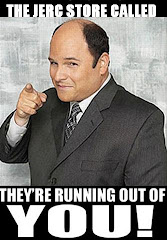 Because it's been so long since my last post, I decided to combine the moderately recent passing of a talented journalist with the very recent passing of a memorable comedian.
Because it's been so long since my last post, I decided to combine the moderately recent passing of a talented journalist with the very recent passing of a memorable comedian.While I was on vacation (June 13), longtime "Meet the Press" moderator, Washington bureau chief and one of Time magazine's 100 most influential people--Tim Russert--died of a heart attack. [For more on Russert's death, click here]
As an American, it's hard to ignore a untimely death of a public figure...but as a fellow journalist (albeit on a much more amateur level), it's sad to see one of the good ones go. Journalists aren't always known as the cuddliest of professionals, but Russert will forever be lauded as an extremely talented and respectable man whose influence on this country and this profession will not soon be forgotten.
More recently, comedian/actor/"disturber of peace" George Carlin died Sunday of heart failure. And for your sake, I hope you've seen at least one of his HBO comedy specials, listened to one of his many comedy albums or at least watched "Bill and Ted's Excellent Adventure."
The Associated Press distributed a comprehensive obituary this week, so rather than me try to reiterate Carlin's career...
LOS ANGELES (AP) — George Carlin, the dean of counterculture comedians whose biting insights on life and language were immortalized in his "Seven Words You Can Never Say On TV" routine, died Sunday. He was 71.Carlin, who had a history of heart trouble, went into St. John's Health Center in Santa Monica complaining of chest pain and died of heart failure later that evening, said his publicist, Jeff Abraham. He had performed as recently as last weekend at the Orleans Casino and Hotel in Las Vegas.
Carlin constantly breached the accepted boundaries of comedy and language, particularly with his routine on the "Seven Words" — all of which are taboo on broadcast TV to this day.
When he uttered all seven at a show in Milwaukee in 1972, he was arrested on charges of disturbing the peace, freed on $150 bail and exonerated when a Wisconsin judge dismissed the case, saying it was indecent but citing free speech and the lack of any disturbance.
The words were later played on a New York radio station, resulting in a 1978 Supreme Court ruling upholding the government's authority to sanction stations for broadcasting offensive language during hours when children might be listening.
Despite his reputation as unapologetically irreverent, Carlin was a television staple through the decades, serving as host of the "Saturday Night Live" debut in 1975 — noting on his Web site that he was "loaded on cocaine all week long" — and appearing some 130 times on "The Tonight Show."
He produced 23 comedy albums, 14 HBO specials, three books, a few TV shows and appeared in several movies, from his own comedy specials to "Bill and Ted's Excellent Adventure" in 1989 — a testament to his range from cerebral satire and cultural commentary to downright silliness (sometimes hitting all points in one stroke).
Carlin won four Grammy Awards for best spoken comedy album and was nominated for five Emmys. Last week, it was announced that Carlin was being awarded the 11th annual Mark Twain Prize for American Humor, which will be presented Nov. 10 in Washington and broadcast on PBS.





No comments:
Post a Comment